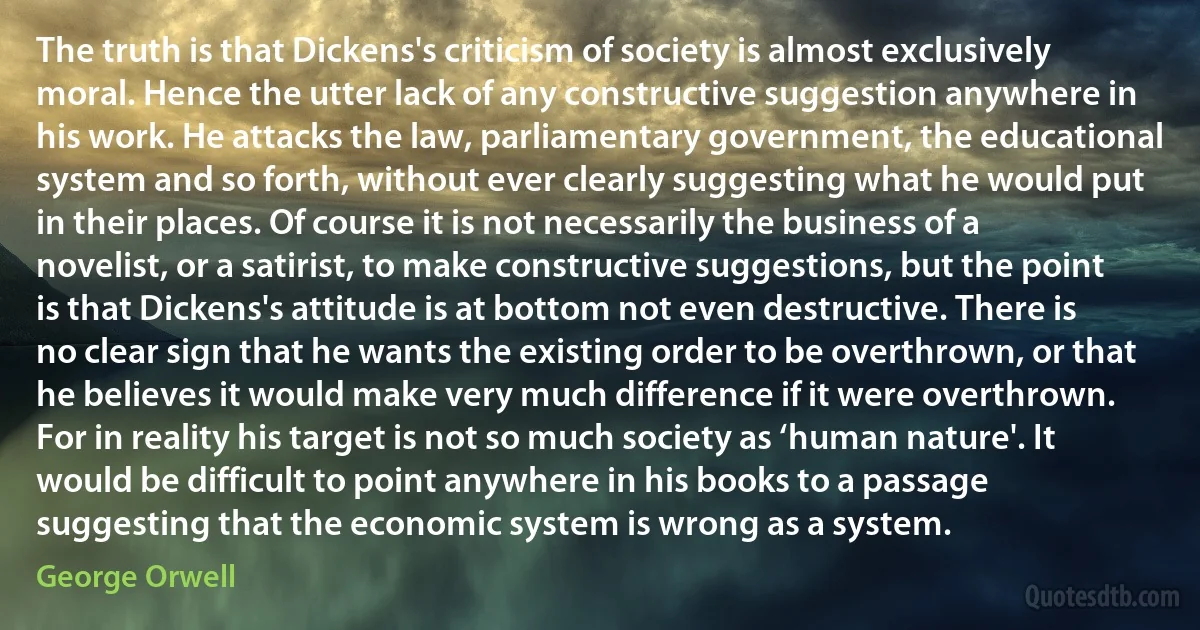
The truth is that Dickens's criticism of society is almost exclusively moral. Hence the utter lack of any constructive suggestion anywhere in his work. He attacks the law, parliamentary government, the educational system and so forth, without ever clearly suggesting what he would put in their places. Of course it is not necessarily the business of a novelist, or a satirist, to make constructive suggestions, but the point is that Dickens's attitude is at bottom not even destructive. There is no clear sign that he wants the existing order to be overthrown, or that he believes it would make very much difference if it were overthrown. For in reality his target is not so much society as ‘human nature'. It would be difficult to point anywhere in his books to a passage suggesting that the economic system is wrong as a system.
George OrwellRelated topics
almost bottom business clear course criticism difference forth government human lack law nature novelist order parliamentary passage point satirist sign suggesting suggestion truth work wrongRelated quotes
I listened to the sermon, and I remember complete astonishment because what they were talking about were things that were just crazy. It was communion time, where you eat this wafer and are supposed to be eating the body of Christ and drinking his blood. My first impression was, "This is a bunch of cannibals they've put me down among!" For some time, I puzzled over this and puzzled over why they were saying these things, because the connection between what they were saying and reality was very tenuous. How the hell did Jesus become something to be eaten?
I guess from that time it was clear to me that religion was largely nonsense--largely magical, superstitious things. In my own teen life, I just couldn't see any point in adopting something based on magic, which was obviously phony and superstitious.

Gene Roddenberry
It should be clear by now that there are people who can, in fact, be reasonably considered experts; that it is rational to rely, within limits, on ex pert opinion; and that it is possible, by exercising relatively simple criteria, to gain insight into whether a particular expert is reliable or not. It is also true that experts, of course, do make mistakes, and that even the agreement of a large majority of experts in a field does not guarantee that they got it right. That's the nature of scientific truth, as we have seen throughout this book: it is tentative, because it is the result of a human endeavor that is limited both by the type and amount of available evidence and by humans' finite mental powers and emotional reactions. But the examples above show how you can, with a little bit of practice, tell science from bunk!

Massimo Pigliucci
I gave up on this stuff. I gave up on my species and ... I gave up on my countrymen. Because I think we squandered great gifts. I think humans were given great great gifts: walking upright, binocular vision, opposable thumb, large brain ... We grew. We had great gifts, and we gave it all up for both money and God ... We gave it all up to superstition, primitive superstition, primitive shit ... Invisible man in the sky, looking down, keeping track of what we do, make sure we don't do the wrong thing, if we do, he puts us in hell, where we burn forever. That kind of shit is very limiting for this brain we have. So we keep ourselves limited. And then we want a toy and a gizmo and gold and we want shiny things, and we want something to plug in that will make big big big things for us... And all that shit is nothing! It's nothing.

George Carlin
The systems view of nature and man is clearly non- anthropocentric, but it is not non-humanistic for all that. It allows us to understand that man is one species of system in a complex and embracing hierarchy of nature, and at the same time it tells us that all systems have value and intrinsic worth. They are goal-oriented, self-maintaining, and self-creating expressions of nature's penchant for order and adjustment. The status of man is not lessened by admitting the amoeba as his kin, nor by recognizing that sociocultural systems are his supersystems. Seeing himself as a connecting link in a complex natural hierarchy cancels man's anthropocentrism, but seeing the hierarchy itself as an expression of self-ordering and self-creating nature bolsters his self-esteem and encourages his humanism.

Ervin László
This one is too elegant, too shiny, like jewelry. It seeks applause. This is clear to me, but difficult to explain, which is what makes abstraction so fascinating. In one sense, abstract art is absolutely nothing, stupid. In 100 years, maybe people will just think it's garbage. But somehow we see something in it; we have a sense of quality. [searching for an illustration of his point, Richter leafs through a catalog to find some of his 'gray monochromes']. I was doing these [monochromes] when I was getting divorced. When you feel totally empty, you do this - but then I saw that one picture was actually better than another. Both were miserable, but the difference was interesting. I loved this: that there must be something, some higher faculty, some progressive sensibility that we find in abstraction. But it is impossible to describe.

Gerhard Richter
